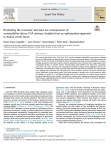Cappella M.T., Nerozzi L., Benini M., Detti P., Blasi E. (2025). Evaluating the economic and land use consequences of sustainability-driven CAP reforms: insights from an optimization approach in Italian cereal farms. Land Use Policy, 01/11/2025, vol. 158, p. 107720.
https://doi.org/10.1016/j.landusepol.2025.107720
https://doi.org/10.1016/j.landusepol.2025.107720
| Titre : | Evaluating the economic and land use consequences of sustainability-driven CAP reforms: insights from an optimization approach in Italian cereal farms (2025) |
| Auteurs : | M.T. Cappella ; L. Nerozzi ; M. Benini ; P. Detti ; E. Blasi |
| Type de document : | Article |
| Dans : | Land Use Policy (vol. 158, November 2025) |
| Article en page(s) : | p. 107720 |
| Langues : | Anglais |
| Langues du résumé : | Anglais |
| Catégories : |
Catégories principales 06 - AGRICULTURE. FORÊTS. PÊCHES ; 6.2 - Politique AgricoleThésaurus IAMM POLITIQUE AGRICOLE ; PAC ; REFORME DE LA PAC ; EVALUATION DE L'IMPACT ; IMPACT ECONOMIQUE ; PROPRIETE FONCIERE ; EUROPE |
| Résumé : | The Common Agricultural Policy (CAP) 2023-2027 introduces stringent sustainability requirements, reshaping land use and influencing crop planning and economic outcomes for European farmers. This study examines the impact of recent CAP reforms on farmland allocation and related implications on farm profitability, in a sample of highly specialized cereal farms located in intensive agricultural areas of Northern Italy. Using Integer Linear Programming models, we simulate farmers' decision-making under different CAP frameworks, considering 2014-2020, 2021-2023, and 2023-2027 environmental constraints changes. Results highlight a shift in crop distribution, with reductions in staple cereals like maize and wheat and increases in legumes, soy, and industrial crops, aligning with biodiversity and soil health goals. These transitions, however, can lead to reduced farm income, particularly in high-output systems, where profit margins are strongly tied to cereal production. While the findings are specific to a well-defined farming context, they underscore the broader tension between ecological targets and economic viability. The study also considers policy adaptations introduced in response to farmer protests, suggesting that greater flexibility and support mechanisms are critical to achieving sustainability without undermining farm resilience. |
| Cote : | En ligne |
| URL / DOI : | https://doi.org/10.1016/j.landusepol.2025.107720 |







